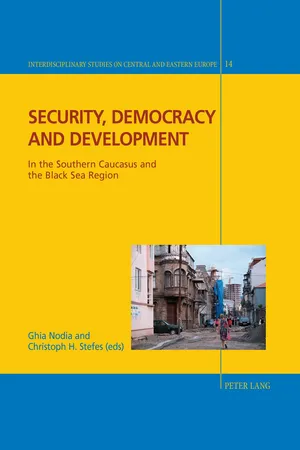
- 380 pages
- English
- PDF
- Available on iOS & Android
About this book
Since the early 1990s, the southern Caucasus and its larger neighbourhood, the Black Sea region, have experienced deep and sometimes painful transformations, including bloody conflicts. They have also become an arena of geopolitical and geoeconomic competition between great powers. This has attracted growing attention from social scientists. In this volume, authors from universities in Europe, the United States and the southern Caucasus focus on several of the most topical problems of the region, particularly how nascent states and societies grapple with the results of unresolved ethno-territorial conflicts and how they try to construct new civil societies from the cultural mosaic that they inherited from their Soviet past. How do elements of democracy and autocracy combine in the political regimes of the new states? Can the West have an effect on their internal development and, if so, how? How do the rich mineral resources of the Caspian region influence the development of the region's economies and define the geopolitical standing of these countries?
Frequently asked questions
- Essential is ideal for learners and professionals who enjoy exploring a wide range of subjects. Access the Essential Library with 800,000+ trusted titles and best-sellers across business, personal growth, and the humanities. Includes unlimited reading time and Standard Read Aloud voice.
- Complete: Perfect for advanced learners and researchers needing full, unrestricted access. Unlock 1.4M+ books across hundreds of subjects, including academic and specialized titles. The Complete Plan also includes advanced features like Premium Read Aloud and Research Assistant.
Please note we cannot support devices running on iOS 13 and Android 7 or earlier. Learn more about using the app.
Information
Table of contents
- Cover
- Contents
- Introduction (Ghia Nodia and Christoph H. Stefes)
- Part One: Elections, Revolutions and Policies
- Part Two: External Actors: Do They Help to Democratize?
- Part Three: (Re)Constructing Identities in a Changing World
- Part Four: Living with Protracted Conflicts
- Part Five: The Politics and Economics of Energy
- Notes on Contributors